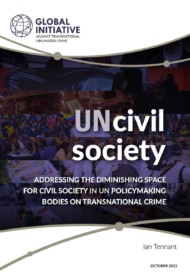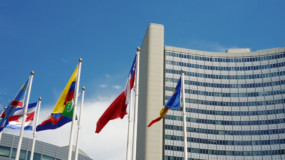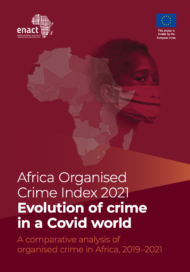Posted on 16 Nov 2022
The 11th Conference of Parties (CoP) to the UN Convention against Transnational Organized Crime and the Protocols Thereto (UNTOC) took place in Vienna (and online) from 17 to 21 October 2022.
Alongside the state parties to the convention, the conference saw the participation of over 500 representatives from civil society organizations (CSOs). The Global Initiative Against Transnational Organized Crime (GI-TOC) delivered statements during the plenary and co-organized side events with state parties and other stakeholders.
In the conference plenary, states spoke in support of the UNTOC’s Implementation Review Mechanism, with some calling for a hastening of the process. There were also renewed commitments to international cooperation, the core purpose of the convention. Some states stipulated the need for a greater role for CSOs in the domestic implementation of policies that deal with transnational organized crime.
Civil society participation
CSO participation was a source of division and tension, and the central focus of proceedings during day one of the conference. Following objections (from the delegations of Azerbaijan and Russia) to some NGOs attending the conference, a tense debate and a series of votes took place after consensus could not be reached. Many delegations agreed with the EU that NGO participation at the CoP was a matter of principle and necessity, and NGOs were granted observer status following a vote where they garnered 58 votes against seven (with 34 abstentions). For more analysis and background on the role of CSOs in UN policymaking bodies on TOC, see the GI-TOC’s policy brief.
Africa’s engagement with the plenary
During the conference, the GI-TOC partnered with the Institute for Security Studies in a side event on Africa and the UNTOC. Experts discussed African countries’ implementation of the convention, and its impact on criminal markets and state resilience to organized crime across Africa, as a civil society contribution to the ongoing review mechanism of the convention.
The African group of countries was represented in the general debate by the Permanent Representative of Ghana to the UN in Vienna. The group statement emphasized that the fight against transnational organized crime is a global and shared responsibility. Praising continental efforts, the statement referred to the African Union’s (AU’s) Mechanism for Police Cooperation and the establishment of the African Observatory for Migration. During the conference, African countries consistently highlighted non-UNTOC initiatives at the regional level and the bilateral agreements that have been signed with non-African states and international organizations, especially in the domains of human smuggling and trafficking.
African delegations emphasized the widespread ratification of the UNTOC, and mentioned ways in which the international legal framework has been implemented in domestic laws. They also used the general discussion to draw attention to how TOC has evolved, addressing cybercrime, wildlife crime, terrorism, migrant smuggling and money laundering. The African group statement raised trafficking in cultural property as an additional issue of concern. Many African countries – including Gabon, Angola and South Africa – used the general discussion to talk about illicit wildlife trafficking and the priority position of this domestically.
Regarding online crimes, a statement by the South African delegation summarized a widely expressed view that this is a key area for the future: ‘Africa should be afforded support through transfer of technology, capacity building, and technical assistance as the continent is digitalizing.’ The Namibian delegation highlighted the need to equip domestic bodies, such as law enforcement, with state-of-the-art technologies. In this respect, African delegations contributed to a general optimism in the room regarding the progress of the discussions towards a new convention under the UN on the use of information and communications technology for criminal purposes. (The GI-TOC’s ongoing analysis of this process can be found here.)
Outside of the general discussion, just 18 African countries spoke at the conference, with Angola and South Africa the two most vocal African delegations. In the general debate, only 15 out of the 76 speakers (less than 20%) were African. (By comparison, Africa has just over 27% of the world’s countries.) Successive items averaged three African speakers. Importantly, African statements in the general discussion were multidimensional, mentioning a wide array of crimes. Below are some key points raised by African delegations in the subsequent agenda items.
The Review Mechanism
Agreeing with complaints from the secretariat, the UNTOC CoP11 saw countries not having appointed their experts as the reason for the Review Mechanism’s slow pace. Of the 33 African countries in groups one and two of the Review Mechanism – those for whom the process has already commenced – only Algeria, Angola, Morocco and South Africa took the floor. With the exception of Angola, these countries pointed out how they had finalized their steps for the first thematic clusters and urged contracting parties to appoint their focal points for the Review Mechanism to continue promptly.
Spread of illicit firearms
The African group labelled the spread of illicit firearms as the continent’s main concern. In fact, one may have expected greater African engagement at the conference on this issue, particularly in light of the ambitious AU-led ‘Silencing the Guns’ initiative. Yet only Mauritius and Angola spoke on this item. Angola highlighted how through its Disarmament Committee it had collected over 112 000 firearms since the initiation of the campaign in 2008. The most comprehensive statements on this topic were issued by the Ghanaian and Ivorian delegations in the general discussion, where they listed their anti-firearm-trafficking laws.
Increased CSO participation
On the theme of increasing CSO participation in national strategies, Morocco highlighted that it had met with CSOs to identify and integrate them into the National Plan to Counter Trafficking in Persons. The Algerian delegation also urged countries to include a broad cross-section of stakeholders in their strategies to counter human trafficking. These were original contributions to the plenary because not many delegations worldwide had given examples of how they have included CSOs in their strategy. At the vote earlier in the week, Côte d’Ivoire was the only African country to vote in favour of inclusion of the NGOs in question.
African leadership on a fourth protocol on wildlife crime
In the margins of the meeting, several states (including African countries) emphasized the leading role they have played in the ongoing discussions around a new UNTOC protocol on wildlife crime. Following the adoption of a resolution on the topic at this year’s UN Commission on Crime Prevention and Criminal Justice, representatives of these countries continued to lend high-level support throughout the CoP in statements and side-event interventions.
The African group general statement was strong and multifaceted, and Africa was aligned with the majority of the positions raised in the CoP. However, few delegations engaged with the specific crime issues as they came up in the plenary. This is not surprising given the sizes of the delegations and the need to negotiate resolutions at the same time, nor is it out of line with past conferences. Yet, given the threat of organized crime across the continent (as evidenced by the results of the Organized Crime Index Africa), more African voices are necessary to ensure that policy development under the UNTOC is responding to African priorities. And while African leadership on wildlife crime is welcomed, there remains a need to engage on implementation and follow up on the commitments that have already been made under the UNTOC.



